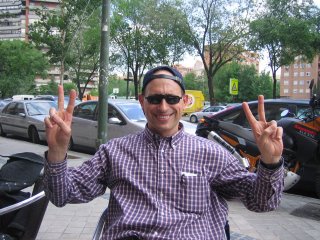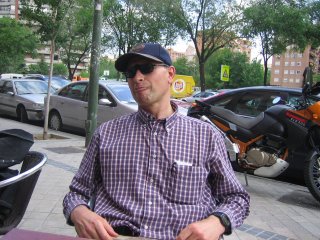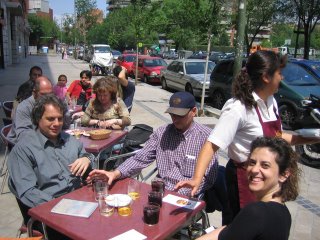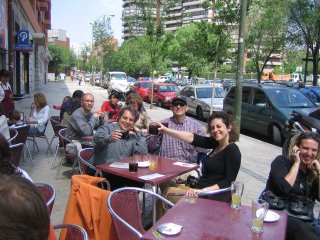Ayn Rand Ideals
From her book Atlas Shrugged, I took the following selection of ideals:
Evil makes others pay for the luxury of his pity. The evil morality states that the more a man produces, the closer he comes to the loss of all his rights, while in order to be placed above rights, above principles, above morality, placed where anything is permitted to him, even plunder and murder, all a man has to do is to be in need. The hero is very aware of his emotions, even under numbness, he feels like the first thrust of a seed breaking through, feeling an emotion he can’t identify at the beginning except perhaps that it seems familiar and very distant, like something experienced long ago. The hero’s highest love is human ability. For the hero, a marble face is the form of a disciplined capacity to feel too deeply. Man’s life must be a straight line of motion from goal to farther goal, each leading to the next and to a single growing sum, like a journey down the track of a railroad, from station to station. Obstacles are thought as unhappy, frustrating events beyond one’s control for the average. Obstacles are things that stand between them now and their objective for heroes. They are full aware of them, when they are very big and hurt them, they see the pain with a certain detachment, with curiosity sometimes. They remain aware of it and then, after some time it’s gone. Not to trust, but to know. First the thought, then the purposeful motion down the straight line of a single track to a chosen goal. Aim is virtue. The hero kicks out “they like it” while thinking “it works!” Machines have two aspects pertaining to human nature radiantly absent: the causeless and the purposeless. Every part of motors are an embodied answer to “Why?” and “’What for?” Humans know that the more thought and planning into achieving a purpose such a building a machine, the higher the probability that the machine will work better, will meet their goals. On the other hand, Evolution makes its improvements with the most terrible and evil of all things, death. The result of reason thinking is a product that beautifully has purpose and cause. The result of Evolution is a product that is full of the purposeless and causeless. Admiration, worship of the product of thought and planning encourages thought and planning. Purpose of life? Living the best you can. Knowing what it is living well is easy, what is difficult is achieving it. Brilliant minds are admired. Admiration in “the rapid precision of performing a duty” in military precision and austerity, speaking with clarity, evenly and with no inflection. The winning of thought and consciousness over feeling and blur. When her heroes must say a truth that hurts them, they speak slowly, without sound of emotion in their voices, only the lifeless pull of effort. The average swears about things he can’t change such as the weather, thinking it is someone’s personal conspiracy against them. The virtues of the hero are those which preserve man’s existence Man’s motive power is this moral code. Ask yourself where your code is leading you and what it offers as your final goal. A viler evil than to murder a man, is to sell him suicide as an act of virtue. Action, even strenuous or dangerous or difficult brings upon joy to the hero’s face. While the hero looks like morning after action that succeeds, the mediocre has a look of chronic hurt and impertinence together. An issue of guilt has to rest upon your own acceptance of the code of justice that pronounces you guilty. The mediocre tries to use the hero’s own sense of honor to force upon him the suffering of dishonor. She tries to extort the hero’s agony at the point of his pity. The hero feels no guilt, no shame, no regret, no
dishonor. The hero knows that his life depends on his mind and his effort, his highest moral purpose to exercise the best of his effort and the fullest capacity of his mind in order to support and expand his life. The average always complains that “he couldn’t help it” and snaps at the unknown judges of their unwitnessed mood “What do you expect?” Heroes always try to identify their emotions, the averages try never to identify their emotions. Heroes work well, consciously at whatever they do “working with swift precision”. They show distinct expert competence with easy movements, intelligently economical. Action is man’s foremost obligation, regardless of anything he feels. Averages have emotions never to be admitted. Evil people repeat that Thinking, Reason and the Brain are of no use, exactly the opposite they are for heroes. Evil people criticize science, knowledge and experiences that prove our thoughts and reason. Evil people want people to feel helpless, to stop considering the problems of the Universe, to make people believe that contradictions are everywhere. Evil people hate logic, syllogisms, self-confidence and convictions. They don’t want people to argue; they want them to accept, to adjust, to
obey. Heroes are not after power and do not live by means of that which they condemn. They regard productive ability as virtue and let the degree of his virtue be the measure of a man’s reward. They don’t draw advantage from the things they regard as evil. Heroes’ posture has the lightness and unselfconscious precision of an arrogantly pure self-confidence. Head lifted, glance intent and purposeful, the glance of competence enjoying its own functions. Looking as if this is his place, his moment and his world, looking as if enjoyment were his natural state, his face the living form of an active, living intelligence, unaware of his body except as of a tout instrument ready to serve his purpose in any manner he wishes. When you look at the hero you are held by a child’s sensation of joy in the immediate moment, by the delight of the unexpected and undiscovered, you are held by the astonishment of realizing how seldom you come upon a sight so truly like, and you feel the seer pleasure of the sight, the pure aesthetic pleasure you have ever experienced. Joy is the core of existence, the motive power of every living being. The eternal savage has a hatred of the mind. The hero feels pain when his achievement is destroyed, recognizes the pain as a salute to the dead and knows that that will pass, that that pain will be gone. That’s when he feels the desolate satisfaction in noting that he is doing it calmly. A train has the tow great attributes of life, motion and purpose. The hero tells himself: “Don’t give yourself time to feel” while keeping his work as fast as possible. A beautiful smile is that which is used not to cover his words, but to stress the audacity of expressing a sincere emotion. Act first – keep the mills going – feel later. Evil people utter nothing but uncertain opinions about physical nature – and nothing but categorical imperatives about men. If enormous bad destroys hope, the hero stands on guard against his own feelings as if some part of him had become a stranger that had to be kept numb, and his will has to be its constant, watchful anesthetic. No claim between heroes should ever be motivated by pain and aimed at pity. The ultimate ugliness is abandoning the will to act. In moments of suffering, the hero never lets pain win its one permanent victory: The hero never allows it to make him lose the desire for joy. The hero feels that others live up to him, if they want him. Man exists for the achievement of his desires. Money is the product of virtue; wealth is the product of man’s capacity to think. When force is the standard, the murderer wins over the pickpocket. Money is the root of all good. The averages indulge their emotions at any cost. The hero sacrifices his emotions as the first cost of any problem. Why are people willing to renounce their highest moments as a sin? Why are they willing to betray the best within them? What made them believe that earth was a realm of evil where despair is their natural fate? What is it that idea available to the simplest man that makes mankind accept the doctrines that lead to self-destruction? * An idea unexpressed in physical action is contemptible hypocrisy.
* Physical action unguided by an idea is a fool's self-fraud.
* They indulge their emotions at any cost, you sacrifice your emotions as the first cost of any problem.
* There are no evil thoughts except one: the refusal to think.
* Called Selfish for: courage of acting on your own judgment and bearing sole responsibility for your own life.
* Called Arrogant for: your independent mind.
* Called Cruel for your unyielding integrity.
* Called Anti-social for your vision that made you venture upon undiscovered roads.
* Called ruthless for the strength and self-discipline of your drive to your purpose.
* Called greedy for the magnificence of your power to create wealth.
* Man's motive power is his moral code. The code that preserves man's existence.
* If he was the kind of rotter she was struggling to make him believe he was, then no issue of his honor and his moral worth would matter to him.
* Why were they ready to renounce their highest moments as sin? Why were they willing to betray the best within them? What made them believe that this earth was a realm of evil where despair was their natural fate?
* But hear them telling the whip-beaten wretches that starvation is prosperity, that slavery is freedom, that torture chambers are brother-love and that if the wretches don't understand it, that it's their own fault that they suffer, and it's the mangled corpses in the jail cellars who're to blame for all their troubles, not the benevolent leaders.
* The trap of a code devised to be broken:
o If we teach a man that it's evil to look at spring flowers and he believes us and then does it -we'll be able to do whatever we please with him. He won't defend himself. He won't feel he's worth it. He won't fight. But save us from the man who lives up to his own standards. Save us from the man of clean conscience. He's the man who'll beat us.
* She seemed unaware of her body except as of a tout instrument ready to serve her purpose in any manner she wished.
* Joy is the core of existence, the motive power of every living being, it is the need of one's body as it is the goal of one's spirit, my body was not a weight of inanimate muscles, but an instrument able to give me an experience of superlative joy to unite my flesh and my spirit.
* When one acts on pity against justice, it is the good whom one punishes for the sake of the evil; when one saves the guilty from suffering, it is the innocent whom one forces to suffer.
* They remained in the lounge merely because an effort was needed to retire to their compartments.
* "You've got to get there, Kip," said the man ominously, in that stubborn monotone of the unthinking which asserts an end without concerns for the means.
* Man must live by his own rational perception of reality, he cannot act against it or escape it or find a substitute for it -and there is no other way for him to live.
Labels: Ayn Rand, Philosophy
What about us?
Wanted to place some php, but this thing does not allow it. At least this way, so I'll have to find new avenues for my creativity.
Going GPS
This is where I am, or where I was these days.
Nokia Nseries Widget
Mannie
In order to view the Nokia Nseries Widget you need JavaScript and Flash Player 9+ support
Supposedly, amazing!
Labels: GPS

Hello Manel, it was a good Saturday evening, warm and relaxed in Madrid. The sun shone for us that day.
I hope your significant other comes along another time.




Starting From Beijing
It all started in Beijing, many years ago, when we were almost friends.
Since then, the world around us has changed, but our carved hearts remain at large.
Welcome again my friend, my lover and my master.





